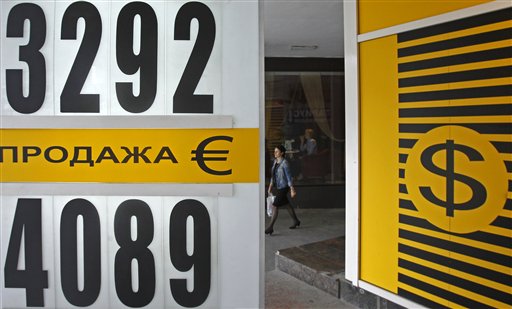(AP) Russian ruble hits lowest in over 3 years
NATALIYA VASILYEVA
AP Business Writer
MOSCOW
Russia’s currency, the ruble, on Friday dropped for the eighth straight day to reach its lowest level since April 2009 as it tracked the falling price of crude oil _ a key source of revenue for the country.
The ruble fell 1.4 percent to 33.9 rubles against the U.S. dollar in early trading on the MICEX exchange. It lost 2.2 percent on Thursday and over 6 percent this week.
The currency’s fate is closely linked to the price of a crude oil contract called the Urals blend, a benchmark for the oil Russia exports. The price of Urals blend has fallen than 5 percent this week and was down another 0.4 percent at $99.4 on Friday.
Moscow’s financial markets also tend to suffer when global investor sentiment drops, as traders pull their money out of riskier, developing markets like Russia to safer havens like U.S. Treasury notes or German bonds. On Friday, global stock markets were down heavily as investors worried that the pace of global economic growth was slowing sharply.
Central Bank Deputy Chairman Sergei Shvetsov reiterated that the bank is not worried about the ruble’s drop.
The Central Bank has placed a limit on the value of the ruble of 38.1 rubles against a basket of currencies including dollars and euros. If it moves beyond that level the central bank will buy rubles on foreign exchange markets.
The value stood at 37.3 rubles in early afternoon trading on Friday.
“The ruble’s volatility within that trading limit is not serious,” Shvetsov told Russian news agencies. “We’re fine with it.”
Over the past three days the Central Bank has bought rubles worth just $100 million on foreign exchange markets.
Chris Weafer, chief strategist at the Troika Dialog investment bank, said in a morning note that “the Central Bank seems content to allow the lower oil – weaker ruble balance to remain untouched.”
Moscow-based investment bank Renaissance Capital last week warned of the upcoming depreciation of the ruble, but noted that the Russian currency so far looked better than many other currencies from emerging economies, which were also battered by an uncertain outlook for the eurozone and weaker global growth.
Hungary’s forint slumped by 2 percent against the U.S. dollar on Friday while the Polish zloty dropped nearly 1 percent.
Renaissance Capital sounded confident that a weaker ruble would not speed up inflation. “Russians no longer respond to the weakening of the ruble by rushing to convert their savings into forex,” the bank said in a statement.
Russia’s MICEX benchmark dropped 1 percent Friday afternoon.

COMMENTS
Please let us know if you're having issues with commenting.